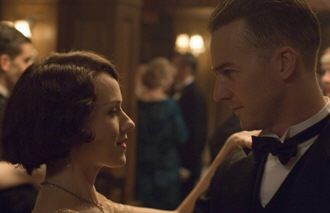| Love me or I’ll burn your hand with lye: Kitty is bored by her husband Walter — perhaps she’d prefer Tyler Durden? |
| The Painted Veil Dir. John Curran; writ. Ron Nyswaner; feat. Edward Norton, Naomi Watts, Toby Jones, Liev Shrieber, Anthony Wong (PG-13) |
This is probably why Kitty, shallow and poorly educated as she is, is incapable of appreciating her husband and takes to an assistant colonial secretary named Charles Townsend (Liev Shreiber). The affair is passionate and provides everything Kitty is lacking, but when it’s discovered by Walter, Townsend refuses to leave his wife or jeopardize his career. Kitty is abandoned. And her husband, one of the most complex male characters to grace the big screen this year, wants vengeance. He will only divorce her (rather than force her to divorce him and discredit herself) if she travels with him to a distant village plagued by cholera. She will probably die, you see. He will, too. But his conviction dictates that he attempt to do something for the sick if he can, and his pain demands that he make his wife suffer terribly. In other words, by playing the angel of grace, he also gets to play the angel of death.
Now that’s cold.
You have to wonder, then: How does one get behind a protagonist who threatens to strangle the life out of his wife and devises an elaborate, guiltless plot to dispatch her? This is where the tangled lives of the two begin to take on real dimension, as the adulterer becomes the victim and the victim becomes the villain. Fane is relentlessly cruel in his indifference. But you begin to understand, and even blame Kitty for it, as Kitty’s shallowness and worthlessness as a person become evident in a scene in which she finds herself incapable of offering much of anything to children at an orphanage where she volunteers. Kitty begins to understand these things about herself, too, and, more importantly, realizes that all that she is lacking can be found in her husband, who selflessly — albeit coldly — attends to the dying masses. She begins to fall in love with the man she married, even as he realizes he cannot blame her for not loving him, since he’s the spousal equivalent of a distant block of ice.
The Painted Veil very much approximates the feel that came to be associated with Merchant-Ivory productions (though the celebrated producer-director pair had nothing to do with the movie): It’s a period piece, dark and moody and ridiculously romantic; there are great performances all around; and the cinematography looks like it was intended for an international travel show. There’s even an unhappy happy ending. Despite how familiar that is, though, expect to be surprised — most of the time.


